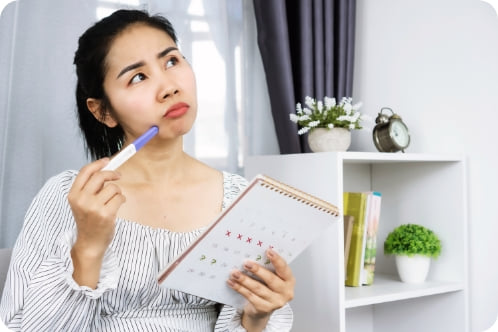What is a period?
A period (menstruation) a bleed which occurs every month, 2 weeks after ovulation and only when an egg has not been fertilised. During ovulation, the womb lining (endometrium) thickens in preparation for a fertilised egg and if an egg is not fertilised in 24 hours of ovulation, the lining is shed in the form of a period. This occurs every month between 21-28 days. Menstruation will generally last for up to 5 days. Day 1 is from the first day of your period and ovulation occurs between days 9-17 of your cycle.
How can a period be late?
Causes for delayed periods:
- Pregnancy
- Pregnancy is one of the most common reasons for a missed or delayed period. A home pregnancy test can help determine if this is the cause.
- Stress
- High levels of physical or emotional stress can disrupt the hormonal balance necessary for a regular menstrual cycle.
- Weight Changes
- Significant weight loss or gain, or disorders like anorexia or obesity, can affect menstrual regularity.
- Polycystic Ovary Syndrome (PCOS)
- PCOS is a hormonal disorder that can cause irregular periods or amenorrhea (absence of menstruation).
- Hormonal Imbalances
- Conditions like thyroid disorders (hypothyroidism or hyperthyroidism) can lead to irregular menstrual cycles.
- Contraceptives
- Starting or stopping birth control, or using other hormonal contraceptives, can affect the menstrual cycle.
- Perimenopause
- As women approach menopause, menstrual cycles can become irregular.
- Intensive Exercise
- Excessive exercise, particularly in athletes, can lead to irregular periods or amenorrhea.
- Illness
- Acute or chronic illnesses can sometimes delay periods.
- Medications
- Some medications, particularly those affecting hormonal levels or the menstrual cycle, can cause delays.
A very common reason why a period can be late is if you have had unprotected intercourse during the cycle and you are pregnant. For late periods, it is always advised to do a pregnancy test. If it has been been less than 3 days since unprotected intercourse, you can take the emergency contraception to prevent pregnancy; please complete the general medical consultation and we can prescribe this for you.
What to do for late periods?
Late period:
While a period delay can be concerning, it often results from non-serious causes. However, understanding your body and consulting with us under general medical consultation when necessary can help manage your menstrual health effectively.
How late is late for a period?
Late period:
If you are 7 days past your expected period due date, this is considered a late period.
What can delay your period?
What can delay a period:
Delay period medicine is called norethisterone. This is a synthetic progesterone hormone medication for period delay and period postpone medication.
How can you delay your period?
How to postpone a period/how to delay your period:
Norethisterone is delay period medication and should be taken 3 days before your period due date. It is normally effective straightaway. The dose is 5mg to be taken three times daily. You get a period every month as your progesterone levels drops and this sheds the womb lining. The norethisterone keeps the levels of progesterone raised, which prevents the shedding of the womb lining and hence your period is delayed.
How late can your period be delayed?
How to delay period:
Norethisterone needs to be taken 3 days before your expected period due date. Norethisterone can delay your period for up to 17 days, but you have to take 20 days of pills.
Medication to delay your period
We provide an e-consultation service where you can fill out the online form and we send out your prescription on the same day for £19. Alternatively, you can book for a telephone or video consultation if you require more advice and information.
